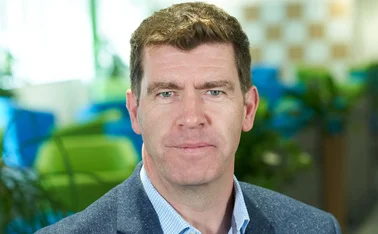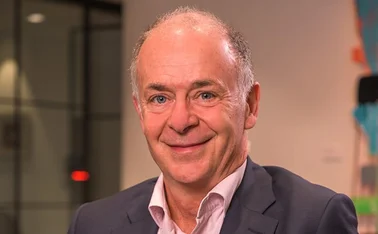
Interview - Patrick Smith: The business of risk

Post caught up with new Airmic chairman Patrick Smith to find out his plans for the organisation and hear more on how risk management is making its way up to the boardroom.
When Patrick Smith was growing up, risk management and insurance were not high on the list of career options for the new Association of Insurance and Risk Managers chairman.
In fact, as a schoolboy, professional cricket seemed to be the most likely way forward for him.
He explains: “When I was at school I played cricket for England Young Cricketers, so I was at Schoolboy International level. I was offered terms in County Cricket, but the reality was I discovered girls and beer – both of which needed a full-time job. There was no money in cricket at that stage, and the rest, as they say, is history.” So, the young Patrick Smith put away his bat and pads and went in search of gainful employment. That journey led to the insurance sector and a position at Commercial Union, where he carried out several roles ranging from branch claims manager to manager of the business process division.
So, the young Patrick Smith put away his bat and pads and went in search of gainful employment. That journey led to the insurance sector and a position at Commercial Union, where he carried out several roles ranging from branch claims manager to manager of the business process division.
Smith says: “I was a claims inspector, so out and about on the road as well as doing operational management. My final role at CU was looking after the business transformation. It sat between the general branches and the technology centre – a kind of chief interpreter – making sure the business articulated its needs and the technology responded.”
As the roles Smith has worked in have developed at different companies, there has been a growing focus on managing risk.
“I guess around 15 years ago, I was designing solutions around the management of risk rather than the purchase or design of insurance. And certainly my experience at Hertz International [as director of risk & claims management for EMEA & Asia Pacific], as with many corporations, was that some of the biggest risks are not insurable. And in many corporations where they are insurable, the business doesn’t necessarily purchase insurance.”
So, the journey that began on the cricket pitch made inroads into insurance soon found a focus in the risk element of the business.
But Smith is adamant it was not a deliberate plan that has taken him to where he is today [chief risk officer, Europe, The Warranty Group]. He says: “I’d love to say there was a clear strategic plan and I knew what the destination looked like and did things to get there. In truth, from a career perspective, I still don’t really know what the destination looks like. I very much prefer to play what’s in front of me,” he comments.
However, it is clear that along the way Smith has picked up plenty of knowledge about how companies can minimise risk, as well as developing a unique view of what the role of insurance is in risk management – making him a perfect candidate for Airmic’c incoming chair.
He says: “I think whether insurance can or should respond is a secondary conversation. My experience tells me that often insurability has been a bit of a red herring, as if to purchase insurance eliminates a risk – it doesn’t. It means it’s transferred, either wholly or partially. But there’s still a risk to be managed. All you’re doing is paying someone else to deal with the consequences of it.” Changing concept of risk
Changing concept of risk
However, the concept of risk has changed over the years and Smith is quick to concede that companies today have to deal with a whole different set of potential problems than their historical counterparts, an issue he hopes will be discussed at this year’s Airmic conference.
Smith explains: “We live in a changing world and I’m not an expert on every industry sector but, as a general rule, regulation is becoming more specific and more intrusive. What that tends to mean is sustainability of an organisation is key.
“It’s also the reality as learned through the financial crisis that no company is too big to fail. And in fact, one of the biggest corporate risks might be the blindness of senior management or boards [to this fact]. So, every type of organisation is prone to a crisis.”
He explains the failure of some very high-profile firms around the world during the recent financial crisis hammered home the importance of taking risk management seriously.
Smith continues: “Often it’s a crisis that reminds you what’s important. We’d all like to be able to predict the future and actually the best risk management tends to go unnoticed because it’s that process that avoids the disaster.
“It should be part of the DNA of the organisation, and if you look at some of the greatest companies, that’s exactly how it is. That’s not to say they’re immune from difficulties but the way they manage them is symptomatic of a good risk culture.”
As Smith says, it is important that companies make risk management part of their natural day-to-day business so it becomes second nature, but he is quick to realise the nature of risks has changed in recent years.
Emerging or established risks?
The industry is awash with talk of cyber threats and hacking posing a threat – indeed, cyber features heavily on the Airmic conference programme – and to a lesser extent, the emergence of business interruptions because of terrorism.
But as far as Smith is concerned, these are not emerging risks, they are already established.
He says: “My general feeling talking to Airmic members is many of the emerging risks have emerged – they’re here. There’s a whole different world order now and there is a reality around talking about cyber – it’s really about data. It’s the reliance on transacting via electronically held data. And there is a sophisticated community that for a number of motivations might seek to be disruptive.
“The other element that’s often overlooked is [focusing on managing] data risk rather than cyber risk, [and the fact we should be] actually upskilling people who hold data - our employees.”
Big risks surrounding data can come from sources as wide as people leaving a suitcase full of customer details on a train to simply not putting sensitive information out of sight when the cleaners come into the office at the end of the day.
Developing the mentality throughout the business of these kinds of data leaks is key, in Smith’s opinion.
He explains: “It can be very simple solutions - raising the awareness of everybody’s individual responsibility, not only to manage our own personal data but also any data we hold for others, such as customers, friends, colleagues, whoever it may be.
“We read fairly routinely of data events, and very rarely do they actually lead to a direct financial loss. More often it’s the damage to the reputation and the trust you have as a business.”
Despite improving things like tightening data security issues, Smith admits sometimes things will go wrong. He says: “The importance – or really the evolution – of risk management is being fantastic at crisis management so when something does happen the way in which an organisation responds could be the make or break in terms of reputation.
“Going forward, the ability to be horizon-scanning so you actually sit ahead of the curve is vital. It’s a matter of making sure that’s important to you – linking risk very clearly with strategy.”
Having buy-in to this sort of strategy at boardroom level and making risk management second nature to companies is a must, says Smith. “That’s developing. And it will continue to develop with a combination of the
top-down approach, so the senior people in the organisation know they’re accountable, and making it important down the chain. That, together with some bottom-up risk assessment, education, learning and development.”
Focused approach
It is this focused approach to risk management that sees Smith takes the Airmic chair having spent five years as a board member. He has a very clear message to members about what to expect from his time at the top.
He says: “I don’t really have a need to strike out for something new for the next 12 months. More it seems my theme will be continuity, making sure we build on the strength of the organisation, which has gone from strength to strength over the last few years.”
That being said, Smith has highlighted certain areas he wants to improve during his time at the top of the organisation. He explains: “We’re very good at physical meetings, the Airmic Academy and conferences and events. But the reality is people are short of time and our ability to increase member engagement virtually is something we’ll be driving ahead and we are investing significantly in new web areas which will take us in that direction.”
The number of Airmic members is also something Smith has highlighted as a growth area, with the new chair preferring instead to concentrate on delivering a better service for existing members than enticing new ones.
“It’s really about how can we drive the engagement of existing members and what our membership would look like in five years’ time, say, or in 2020,” Smith explains. “In my mind from time to time we may decide to have membership targets but to a certain degree I think more about quality over quantity. There’s very little point in filling our organisation up with people we can’t service.”
Smith does not foresee Airmic’s relationship with insurers and brokers changing in the future either, and has vowed to keep acting as the cement between members and the insurance industry.
He says: “Airmic works very closely with insurers and brokers. It is there for the benefit of our members, so part of our duty and our service to our members is to make sure the service they receive from brokers and insurers is fair, equitable and that we are driving the overall agenda for those things that are important in that relationship around fairness, transparency and cost effectiveness.
“As I see it, Airmic is to an extent the glue between our members, brokers and insurers. We’re very much lobbyists on behalf of our members but absolutely recognise that three-way relationship.”
Ready to fight
The insurance sector will be pleased to hear that Smith sees the relationship between its members as pretty much plain sailing – but he is ready to fight if issues arrive.
He explains: “It’s an exceedingly mature relationship [between Airmic and insurers]. We’re not an organisation that feels the need to cross swords, but given that we have those close relationships, the difficulties are discussed individually or to the community as a whole.”
Airmic members will be pleased that such a man with such dedication to risk management and to the organisation will be taking the chair in Liverpool next week.
Before he meets the entire organisation at the Airmic conference, Smith gave Post a taster of what members can expect from his time at the helm. He says: “They can expect from me just a continual drive to make Airmic as their association the very best that it can be.”
Only users who have a paid subscription or are part of a corporate subscription are able to print or copy content.
To access these options, along with all other subscription benefits, please contact info@postonline.co.uk or view our subscription options here: http://subscriptions.postonline.co.uk/subscribe
You are currently unable to print this content. Please contact info@postonline.co.uk to find out more.
You are currently unable to copy this content. Please contact info@postonline.co.uk to find out more.
Copyright Infopro Digital Limited. All rights reserved.
As outlined in our terms and conditions, https://www.infopro-digital.com/terms-and-conditions/subscriptions/ (point 2.4), printing is limited to a single copy.
If you would like to purchase additional rights please email info@postonline.co.uk
Copyright Infopro Digital Limited. All rights reserved.
You may share this content using our article tools. As outlined in our terms and conditions, https://www.infopro-digital.com/terms-and-conditions/subscriptions/ (clause 2.4), an Authorised User may only make one copy of the materials for their own personal use. You must also comply with the restrictions in clause 2.5.
If you would like to purchase additional rights please email info@postonline.co.uk







